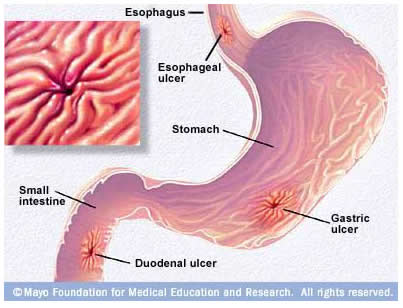The Common Stomach Ulcer Symptoms in Women and Men
Abdominal pain is one of the most common stomach ulcer symptoms both in women and men. As the name implies, stomach ulcer is a sore of the lining inside the stomach. It is part of a major digestive problem called peptic ulcers (the open sores that can occur along inside the lining of esophagus to the upper part of small intestine).
The prognosis of stomach ulcer is closely dependent on your commitment to follow the treatment plan as prescribed.
It is more likely to reoccur if untreated completely. But if you follow completely the treatment and take all medications directed by your doctor, you’re less likely to develop another ulcer.
The lining of small intestines and stomach has a natural protector to protect it against the irritating acids.
But due to certain reason, sometimes this protective lining is no longer to work as well as it should. As a result, there is a chance for the lining to get inflammation. The acids can irritate the lining of your stomach and intestines, making a painful open sore ‘ulcer’ more likely.
In many cases, this inflammation occurs in the first layer of the deepest /inner lining. If left untreated, this may get worse and increase the risk of a perforation. Perforation is a hole of stomach and duodenum – it is a medical emergency, immediate medical intervention is necessary in such a case.
In fact, H-pylori bacteria are pretty common to be found in many patients with peptic ulcers. They usually lives in the GI (gastrointestinal) track.
Interestingly, not all people with this bacterial infection develop peptic ulcers. The following are more FAQs about the H-pylori infection:
Unfortunately, there is still no answer for this question.
In many cases, the infection is diagnosed at later stage or later in life. The infection may have been present at childhood.
How to diagnose the infection? A blood test is usually one of common procedures to diagnose the infection.
If necessary, other tests are probably required. Your doctor may perform a test to analyze a sample of the stool. Sometimes a biopsy ‘removing or taking a sample of tissue’, is also used.
How to get rid of the infection? There are several treatments to choose from. The main one is with antibiotics.
Can the infection increase the risk of cancer? This is not clear yet, though it might have a role to increase the risk of stomach cancer, some studies suggest!
The following is the picture (credit to Mayo Clinic) to describe 3 major locations of ulcers.

Since not all people with H-pylori infection develop stomach ulcer, other factors may have a role.
The use of excessive pain relievers such as ibuprofen, naproxen, ketoprofen, and aspirin or other NSAIDs ‘nonsteroidal anti-inflammatory drugs’ may increase the risk of triggering inflammation of the stomach’s & intestine’s lining. Statistics show that peptic ulcers are quite common in older adults who frequently take these pain medications.
It’s much better to take pain relievers with meals to reduce the side effects or ask your doctor for more advice! Or if you are diagnosed with stomach ulcer, make sure your pain reliever doesn’t provoke the problem. Your doctor may prescribe a safe pain reliever such as acetaminophen.
In addition, the use of prescription medicines such as Fosamax, Actonel, or other bisphosphonates for the treatment of osteoporosis may also lead to peptic ulcers, according to Mayo Clinic.
Other risk factors (factors or conditions that increase the risk) may include:
- Chewing tobacco /smoking cigarettes.
- Excessively drinking alcohol.
- Certain radiation therapies.
- Stress! Uncontrolled stress may not significantly increase your risk, but with other factors mentioned above, it would make peptic ulcers more likely.
- Being very ill due to other diseases may also aggravate the problem!
How about a family history of peptic ulcers? This issue may be still debatable – while some experts believe that stomach ulcers may run in families, others don’t.
Generally there is no significant distinction between women and men with the condition. Sometimes, there is no any signs and symptoms until the inflammation becomes advanced.
What else?



